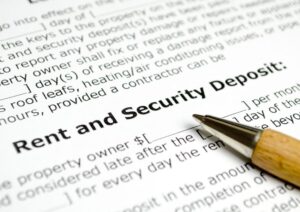Some Ways to Help Get Your Deposit Back
Renting a home or apartment can be an exciting time, but it can also come with its fair share of stress, especially when it comes to getting your rental deposit back. The rental or security deposit is a sum of money that a landlord or property management company holds as collateral against any damages (sometimes lost rent) that may occur to the rental property during your stay. As a renter, it is important to take steps to ensure that you receive your full deposit back when you move out. In this article, we will discuss how to be sure to get all of your rental deposit back.

- Understand the Terms of Your Lease
This first step is crucial in ensuring that you get your rental deposit back! The best thing you can do is to understand the terms of your lease. Your lease agreement should outline the conditions under which your deposit will be returned, as well as any deductions that may be made. It is important to carefully review your lease agreement and ask your landlord or property management company any questions you may have.
- Document the Condition of the Property
Before moving into the rental property, it is important to document its condition. Take photos and/or videos of every room, including any existing damages, and keep these records in a safe place. You should also make note of any damages or issues with the property in writing and provide a copy to your landlord or property management company.
- Keep the Property Clean and Well-Maintained
One of the most important factors in getting your rental deposit back is keeping the property clean and well-maintained during your stay. This means cleaning regularly, reporting any maintenance issues to your landlord promptly, and taking care not to damage the property. If you do cause any damage, it is important to have it repaired as soon as possible to prevent further damage and to minimize the cost of repairs.
- Give Proper Notice
Most leases require tenants to give a certain amount of notice before moving out. This notice period can range from a few days to several weeks, depending on the terms of your lease. Make sure you give your landlord or property management company proper notice before moving out, and confirm that they have received it.
- Complete a Move-Out Inspection
Before moving out, it is a good idea to request a move-out inspection from your landlord or property management company. This inspection will give you an opportunity to discuss any damages or issues that need to be addressed before you move out. Be sure to attend the inspection and take notes, and ask for a copy of the inspection report.
- Make Necessary Repairs
If the move-out inspection reveals any damages, it is your responsibility to have them repaired. You can either make the repairs yourself or hire a professional to do so. Keep records of all repairs made and provide copies to your landlord or property management company.
- Clean the Property Thoroughly
Before moving out, it is important to clean the property thoroughly. This means cleaning all rooms, including bathrooms and kitchens, and removing any personal belongings. You should also vacuum or sweep the floors, wipe down all surfaces, and clean the appliances.
- Return All Keys
Finally, make sure you return all keys to the rental property, including any copies you may have made. Failure to return all keys can result in additional charges or deductions from your rental deposit.
Getting your rental deposit back requires careful planning and attention to detail. By following these steps, you can ensure that you receive your full rental deposit back when you move out. Remember to document the condition of the property, keep it clean and well-maintained, give proper notice, complete a move-out inspection, make necessary repairs, clean the property thoroughly, and return all keys. With these tips in mind, you can enjoy moving out in a stress free manner! Remember, this is not intended as legal advice and should not be used such. Please check your states applicable laws.



